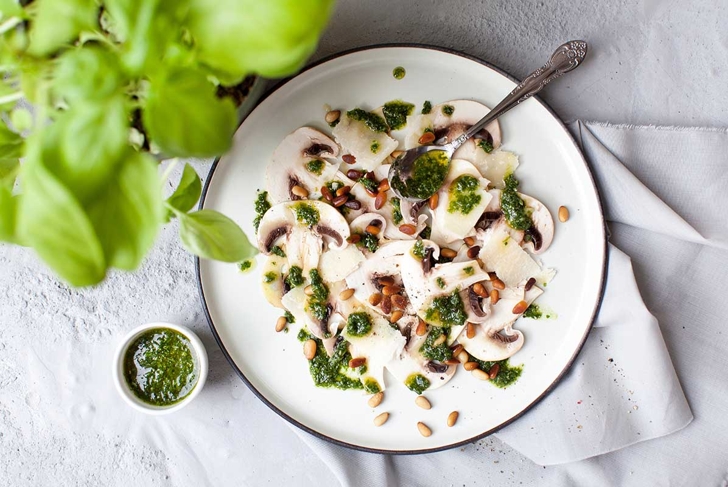
Whether added to a salad, soup, or stir-fry, or taken in supplement form, there are a myriad of ways to add mushrooms to your diet—and why not? In addition to mushrooms’ delicious taste, their polyphenol, polysaccharide (a specialized type of carbohydrate), vitamin, and mineral contents can provide you with a bounty of health benefits.
Boost immune system

Research has shown that mushrooms help to stimulate the activity of microphages—white blood cells within the immune system—to help fight off foreign bodies more effectively. At the same time, anti-inflammatory effects of mushrooms can work to enhance the immune system’s overall efficiency.
This Chicken Barley Mushroom Soup acts as a highly nutritious and mushroom-rich version of the age-old common cold elixir.
Fight inflammation

Rich in antioxidants, mushrooms offer significant anti-inflammatory effects. Research indicates that eating mushrooms regularly can help reduce inflammation associated with the development of chronic diseases, such as cardiovascular disease, cancer, Alzheimer’s disease, diabetes, and arthritis.
This Grilled Mushroom Salad with Pesto Dressing is a delicious way to take advantage of mushrooms’ robust levels of healthy antioxidants.
Offer anti-cancer properties

Polysaccharides, contained in mushrooms, have been found to induce apoptosis—cancer cell death. Further, anti-inflammatory effects of mushrooms can help reduce chronic inflammation that can lead to the development of cancer.
If you’re looking to add some mushrooms to your lunch menu, this Crab Cap Salad uses meaty and umami-rich portobellos as a holder for a light-tasting seafood salad.
May help fight diabetes

Mushrooms have been found to help lower blood sugar levels. Their bioactive metabolites, such as their polysaccharides and proteins, have been found to work as successful anti-hyperglycemic agents in diabetes treatment studies. Still, more research is needed to discern how mushrooms may be effectively used in the fight against diabetes.
These Dark Chocolate Mushroom Bliss Balls make a delightful and healthy dessert that also harnesses the power of mushrooms for your health.
Regulate cholesterol

Because of their high fiber and low fat content, mushrooms are a great food for helping to control cholesterol levels. Shiitake mushrooms contain eritadenine, which has been found to help reduce cholesterol in the blood, while their beta-glucan content helps to reduce inflammation and block cholesterol from being absorbed through the intestines.
Giving a plant-based diet a go for healthier cholesterol levels? This Mushroom Gravy can be a delicious stand-in for traditional meat-based gravies.
Support gut health

Mushrooms can help support your gut health in two ways. First, they provide your body with prebiotics—nutrients that act as food for the beneficial bacteria in your gut. Second, mushrooms, such as cremini mushrooms, provide your system with helpful bacteria that can help populate your gut to improve your digestion and immune responses.
These Crispy Breaded Sauerkraut Balls with Tempeh, Chia, and Mushrooms are made with a range of gut-loving ingredients.
Offer antifungal and antibacterial effects

Mushrooms possess both antibacterial and antifungal compounds that help them survive, making them a natural source of antibiotics and antifungals that can be utilized by humans. Some mushrooms have been found to offer compounds with considerable activity against bacteria such as E. coli, Staphylococcus aureus, and Bacillus subtilis.
Explore the many varieties of mushrooms available from season to season with this Marvelous Mushroom and Leek Spread.
Provide antiviral effects

Whole mushroom extracts, as well as some of mushrooms’ isolated compounds, have been found to inhibit certain viruses. Studies on some compounds contained in mushrooms that act against viruses such as HIV, influenza A, and hepatitis C have even shown antiviral effects that are comparable to that of antiviral drugs.
Using more mushrooms in your cooking is easy when you have this Mushroom Broth on hand—a wonderful base for soups, a star in risottos, or perfect for braising fish, such as salmon or halibut.
Protect the liver

Some mushroom extracts have been found to provide liver-protecting properties. Study findings suggest that eating mushrooms on a regular basis can alleviate non-alcoholic fatty liver disease (NAFLD). These findings are believed to be linked to the anti-inflammatory and antioxidant properties of mushrooms.
You can support your liver health by including plant-rich dishes in your day, such as this Grapefruit and Mushroom “Scallop” Salad.
Reduce allergies

While mushrooms have been found to stimulate the immune system in certain circumstances, they have also been found to help suppress immune response in other instances—making them potentially beneficial in the battle against allergies. Beta-glucans, which are contained in mushrooms, have been found to help reduce the severity of symptoms in those with ragweed allergies by 52 percent when taken as a supplement.
If allergies to certain foods are an issue, this Spinach Mushroom Roulade is a show-stopping side dish that allows you to easily sub in different ingredients.





